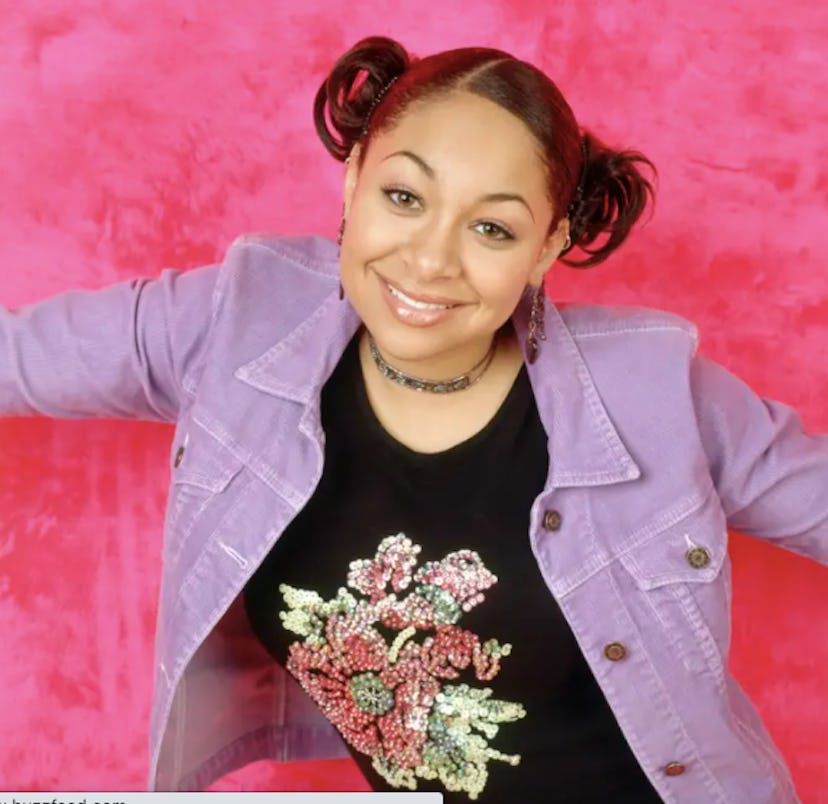TV & Movies
A Celebration Of Black Women On Television, From Raven Baxter To Miranda Bailey
Long may they reign.

I remember one of the first times that I saw someone on TV that looked like me. Her name was Raven Baxter and she was the star of That’s So Raven. In this particular episode Raven was photographed for a magazine that went on to digitally alter her image to make her body appear thinner. As a young Black girl who's never really been "thin" by society's standards, seeing Raven grapple with her body image — and stand up to the magazine — resonated in ways that I never knew possible.
But it's not just Raven Baxter who's made me feel this way. I later discovered women like Phylicia Rashad, Diahann Carroll, and Michaela Coel. Black women who have embodied legendary roles such Clair Huxtable, Julia Baker, and Arabella Essiedu. Fully-formed, multi-dimension, complex, and often complicated women. The kinds of characters who weren't just iconic and influential because they were Black — but because of the many facets of Black womanhood these characters represented.
To celebrate them, we've compiled a list of the Black women who have helped to shape representation on television. Long may they reign.
Chandra Wilson in Grey's Anatomy
Chandra Wilson’s character, Miranda Bailey, is a hard-working Black woman that like many of us, falls down, but always manages to pick herself back up. But beyond her meteoric rise at Seattle Grace Hospital, what I love about this character is her mental health journey. The show has spotlighted Bailey's struggle with OCD, and in the process has helped to shed light on the lack of awareness for Black people’s mental health. Her OCD doesn't define her, but it is an important part of her character.
Janet Hubert in The Fresh Prince of Bel-Air
Seeing a Black woman with dark skin in the media is a rarity. Let alone one who's allowed to be as multi-dimensional and aspirational as Aunt Viv. Most women on TV, and especially at the time of Fresh Prince, have been light-skinned. (Light-skinned women were also shown to be more desirable on shows of the era, such as Martin.) But Aunt Viv defied all of this and gave us dark-skinned girls a powerful role model, who just so happened to also live in a mansion in Bel-Air.
Diahann Carroll in Julia
Diahann Carroll’s role as the titular Julia was generation-defining for a whole host of reasons. On the show, Carroll played a single, widowed mother who was also a nurse. Carroll, who became a sitcom pioneer for this role, transcended racial barriers to tell the story of a Black professional woman who was not a minor character, a maid, or a servant — but a leading woman. And this was in the '60s!
Phylicia Rashad in The Cosby Show
For her work in The Cosby Show, Phylicia Rashad, earned the title of “Mother of the Black Community” at the 2010 NAACP Image Awards. But as she shared in a recent interview with Bustle, “In mothering, I didn’t think about myself as being a Black mother. I’m a mother.” And as Clair Huxtable proves, Black mothers are, in fact, just mothers with the same aspirations as any other mother of a different race. Huxtable also subverted the notion that a woman has to be a stay-at-home mother. Rashad proved that mothers could be and do anything they wanted to, as she was a powerful lawyer and one hell of a mom.
Teyonah Parris in WandaVision
A strong and ambitious leading Black woman is exactly what the Marvel Cinematic Universe has been missing up until now. As the first female Black character to join the Avengers, Parris’ Monica Rambeau has helped make the Marvel universe more reflective of the world we live in. But what I love most about her is that she's shown with her natural hair — and that beauty choice only adds to the greatness of an already intelligent, resilient, and compassionate character.
Raven Symone in That’s So Raven
What I love most about Raven Baxter was that she was unapologetically Black. At a time when The Disney Channel was dominated by the stories of white women like Lizzie McGuire, Raven was a breath of fresh air for women like me. Her role was influential because she worked through normal teen girl issues while also grappling with her Blackness. And in doing so, Raven gave Black girls confidence. She brought issues like eating disorders and body positivity to the forefront, something which wasn't common at the time.
Michaela Coel In I May Destroy You
Michaela Coel made I May Destroy You her way. Coel served as the showrunner, director, writer, and star of her hit HBO series. But it wasn't easy getting full creative control: she turned down many lucrative deals, and had to fight tooth and nail to tell the story on her own terms. In the end, I May Destroy You is a fictionalized account of Coel's experience with sexual assault assault. And through Coel's Arabella, we saw Black British women as they are: human. We got to see Black women making mistakes, grappling with trauma, and finding their own unique way to heal — all thanks to Coel's singular vision.